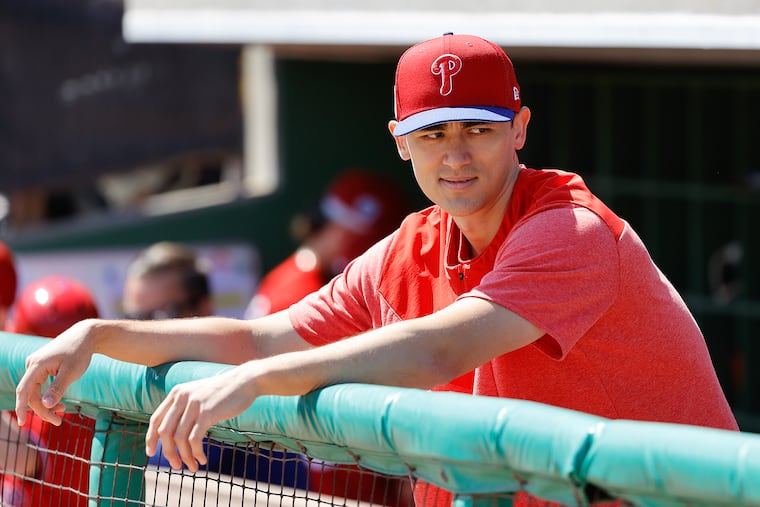Phillies move on from Rule 5 pick Noah Song
The 26-year-old righty was designated for assignment, ending his longshot bid to make his major league debut with the Phillies after not pitching competitively since 2019.

PITTSBURGH — For a few days three weeks ago, the Phillies could squint and see Noah Song pitching for them in the majors this season.
One outing, in particular, stood out. On the Fourth of July, at low-A Clearwater, Song faced eight batters and struck out four. His fastball sizzled in the mid-90s, the hardest he’d thrown since 2019, and team officials thought their Rule 5 draft pick — a baseball lottery ticket, if ever there was one — might actually pan out.
But in the end, Song wasn’t ready. Not yet, at least. He went three years without pitching competitively while serving in the Navy and wasn’t going to make up for all that lost time during a 30-day minor league assignment.
» READ MORE: Only one pitcher knows the journey from Navy to the majors
And so, faced with a deadline Saturday to add Song to the active roster for the duration of the season — a stipulation that comes with every Rule 5 selection — the Phillies reinstated the 26-year-old righty from the 60-day injured list and designated him for assignment, ending his longshot bid for a spot in their bullpen.
The Phillies can trade Song, although his Rule 5 status would carry over to a new team, before the trade deadline at 6 p.m. Tuesday. Otherwise, they must put him through waivers.
If he clears — and officials from multiple clubs, including some with the Phillies, doubt he will go unclaimed — the Phillies would have to offer him back to the Red Sox, his original team, for $50,000. Boston is believed to want him back.
“We watched him right until the very end, and we just felt, at this point, it would be very difficult for us trying to get into the postseason to carry him at the back end as the 13th pitcher on our roster,” president of baseball operations Dave Dombrowski said by phone. “We just thought that would be difficult for us to do. We felt that spot is going to be valuable for us going down the stretch.”
It might be easier for a noncontender to carry Song. But stashing him as a long reliever would have limited the Phillies’ flexibility in one area of the roster where they have depth.
And it was clear from his monthlong minor league assignment that Song is early in the process of coming back to baseball after a protracted layoff.
» READ MORE: A year later, trading for Brandon Marsh is still paying off for the Phillies
In eight appearances across three levels (low-A Clearwater, double-A Reading, triple-A Lehigh Valley), Song allowed nine runs on 12 hits and 11 walks for a 7.36 ERA. His fastball velocity, which was in the upper-90s before he left baseball in 2019, was in the 92-94 mph range.
None of this was surprising. Song’s path back to baseball is largely unprecedented. Only one Navy graduate has pitched in the majors since 1921, and reliever Mitch Harris returned from five years in the military by spending two seasons in the minors before getting called up by the St. Louis Cardinals in 2015.
By designating Song for assignment, the Phillies bought a few days to attempt to trade him before the deadline. Dombrowski said he wasn’t close to a deal for Song, although he has talked with a few teams about him.
» READ MORE: Phillies observations: Four teams for buyers to watch at the trade deadline and more
So, why did the Phillies take a chance on Song in the first place?
Because he represented the ultimate flier. He opened eyes in a cameo in Boston’s system in 2019, posting a 1.06 ERA in seven starts. And when the Phillies picked Song in the Rule 5 draft, they didn’t expect that the Navy would transfer his service to reserve duty, a request he had made unsuccessfully for several years.
Song finally received his transfer in late February and reported to spring training in Clearwater, Fla. He began the season on the injured list with what the Phillies characterized as a strained lower back. Once healthy, he went on a minor league assignment that lasted a maximum of 30 days, ending Thursday and forcing the Phillies into a decision.
“We have seen flashes that we’ve really liked,” Dombrowski said. “When you think about what he’s accomplished after being out of baseball for an extended period, it’s really quite amazing that he’s thrown the ball as well as he has at times. But it’s a long buildup, there’s some inconsistencies, he dealt with some tenderness.
“I wish we had the ability to go ahead and just send him to the minor leagues and let him go out and start on a consistent basis every five days, but that’s not a luxury we have at this point.”